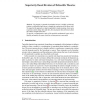Free Online Productivity Tools
i2Speak
i2Symbol
i2OCR
iTex2Img
iWeb2Print
iWeb2Shot
i2Type
iPdf2Split
iPdf2Merge
i2Bopomofo
i2Arabic
i2Style
i2Image
i2PDF
iLatex2Rtf
Sci2ools
111
click to vote
RULEML
2010
Springer
2010
Springer
Superiority Based Revision of Defeasible Theories
We propose a systematic investigation on how to modify a preference relation in a defeasible logic theory to change the conclusions of the theory itself. We argue that the approach we adopt is applicable to legal reasoning, where users, in general, cannot change facts and rules, but can propose their preferences about the relative strength of the rules. We provide a comprehensive study of the possible combinatorial cases and we identify and analyse the cases where the revision process is successful.
Defeasible Logic Theory | Internet Technology | Possible Combinatorial Cases | Preference Relation | RULEML 2010 |
| Added | 30 Jan 2011 |
| Updated | 30 Jan 2011 |
| Type | Journal |
| Year | 2010 |
| Where | RULEML |
| Authors | Guido Governatori, Francesco Olivieri, Simone Scannapieco, Matteo Cristani |
Comments (0)

